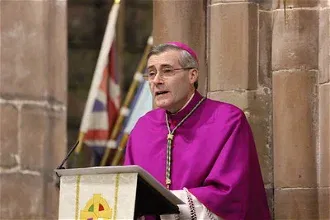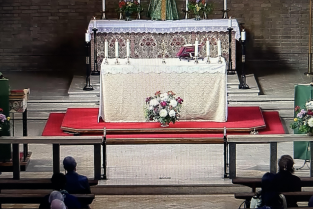Catholics must resist 'dark and sinister path' to assisted suicide

Image: Bishop Mark Davies
The Bishop of Shrewsbury is this weekend urging the Catholics of his diocese to resist moves in Parliament to legalise assisted suicide.
In a pastoral letter being read out at all Masses over the weekend of Sunday October 13, the Rt Rev Mark Davies will warn the faithful that a forthcoming Bill on "assisted dying" - a euphemism for assisted suicide or euthanasia - threatens "a momentous change to society in both its care and attitude to the sick and the aged".
In his letter, which follows in full, Bishop Davies predicts dire consequences if Parliament chose a "dark and sinister path" towards a society in which the medical profession will be asked to assist in the killing of their patients.
He urges everyone "not to delay" in taking "urgent action" by contacting their MPs "to express opposition to this dangerous proposal and to urge that greater support and resources be given to end of life, palliative care"
"As we see populations ageing across western countries with a diminished number of younger people to support them, this is an especially dangerous moment for politicians to open the door to euthanasia: the medical killing of the sick, the disabled and the elderly," Bishop Davies will say.
"We already hear of a social duty to end our lives when we become a burden to others. This is not the kind of society in which we would wish to grow old or become vulnerable. If medical professionals, now sworn to protect the lives of patients, become those who assist in killing and suicide, how will our relationship change to those we look to for help and care? This is, indeed, a dark and sinister path on which we could be embarking before Christmas 2024."
The pastoral letter comes in response to the announcement by Kim Leadbeater, the Labour MP for Spen Valley, West Yorkshire, that on October 16 she will introduce a Private Member's Bill to legalise "assisted dying" into the House of Commons.
Called "Choice at the End of Life", the Bill will receive a Second Reading, in which MPs can vote with their conscience on the Bill, on November 29.
Already, a group of more than 50 MPs are pushing for broader access to assisted suicide. They say people who are suffering "incurably" should be able to ask for lethal drugs to take their own lives along with those who have terminal illnesses.
In jurisdictions where this has been allowed, people with mental health illnesses, such as anorexia, post-traumatic stress disorder and autism, have been killed at the hands of their doctors.
Sir Keir Starmer, the Prime Minister, promised an assisted suicide Bill ahead of the general election in July and is expected to give the Bill time to proceed into law if the House of Commons votes in favour.
November 29 will be the first time MPs will be given a free vote on assisted suicide since 2015 when a Bill introduced by Labour MP Rob Marris was rejected by 330 votes to 118. Last month, the Bishops' Conference of England and Wales offered resources to Catholics to help them to combat the threat of assisted suicide and euthanasia.
At present the 1961 Suicide Act makes assisting a suicide punishable by up to 14 years in prison, though prosecutions and jail sentences are extremely rare.
For further information
Pastoral Letter in Full:
On the Threat of Assisted Suicide
To be read at all Masses on Sunday 13th October 2024
My dear brothers and sisters,
This week an 'assisted suicide' Bill will be introduced into Parliament. The Bill will seek to remove the legal safeguards which have long protected some of the most vulnerable members of society to allow medically assisted suicide. The government has indicated it will provide time for this legislation which will be considered on a free vote. It is hard to fathom why this proposal is such an urgent priority and why parliament will proceed in haste even voting before Christmas. This is especially troubling when we recall that due to its dangers, assisted suicide was overwhelmingly rejected by the House of Commons only nine years agoi.
The proposal to be put before Parliament poses the same dangers and challenges the same moral foundations on which our laws have been based. In today's Gospel, a young man affirms he has kept the Ten Commandments from his earliest days. For inscribed into the human heart from the beginning is the command: "You shall not kill"ii. This prohibition safeguards a great good which has led us to value and hold human life sacred. We can say that from the beginning, this command has formed our society at its best in the care of the sick, the aged and the most vulnerable.
The decision MPs are about to make is heralded as a historic vote because it threatens a momentous change to society in both its care and attitude to the sick and the aged. This change could be decided within a matter of weeks, allowing our parliamentary representatives little time to consider the enormity of the moral choice. I am therefore asking you to take urgent action in contacting your Member of Parliament to express opposition to this dangerous proposal and to urge that greater support and resources be given to end of life, palliative care. It is surely a scandal that Hospices, providing pain relief and care for those at the end of their lives, are often left in financial deficit and need.
Today, I must also warn where crossing the moral boundary set by the command "You shall not kill" will lead. Elsewhere in the world we have seen how similar laws permitting medical professionals to assist their patients in suicide have been extended wider and wider to encompass those with mental health problems and even young children. We have witnessed a similar trajectory since the Abortion Act of 1967: initially agreed by Parliament to address 'hard cases', this law has been tragically responsible for the destruction of many millions of human lives.
As we see populations ageing across western countries with a diminished number of younger people to support them, this is an especially dangerous moment for politicians to open the door to euthanasia: the medical killing of the sick, the disabled and the elderly. We already hear of a social duty to end our lives when we become a burden to others. This is not the kind of society in which we would wish to grow old or become vulnerable! If medical professionals, now sworn to protect the lives of patients, become those who assist in killing and suicide, how will our relationship change to those we look to for help and care? This is, indeed, a dark and sinister path on which we could be embarking before Christmas 2024.
The pre-Christian mind may have thought it reasonable to dispose of a human life, yet, through the Christian Centuries we have seen how the command "You shall not kill," has protected the most vulnerable and led society to generously care for those at the end of their lives. The Church's Catechism explains how discontinuing burdensome, extraordinary or disproportionate medical procedures and using pain relief to alleviate the suffering of the dying, even at risk of shortening their days, can stand in harmony with this commandiii. Yet, these considerations in genuine medical care belong to a different moral universe to deliberately killing another human being or assisting someone to commit suicide.
Let us pray that a decisive rejection of the proposal being placed before Parliament will lead society to affirm the value of human life anew, by devoting ourselves more generously to the support of the aged; to the relief of suffering and to truly assisting those at the end of their lives. I ask you not to delay in contacting your Member of Parliament, whose postal and e-mail address can be found in the parish newsletter today.
United with you in this witness to the Gospel of Life, + Mark
Bishop of Shrewsbury
i The House of Commons voted 330 to 118 to reject Assisted Suicide in 2015
ii Cf. Mk. 19
iii Cf. Catechism of the Catholic Church No. 2279


















